Partnering with patients in the fight against prostate cancer
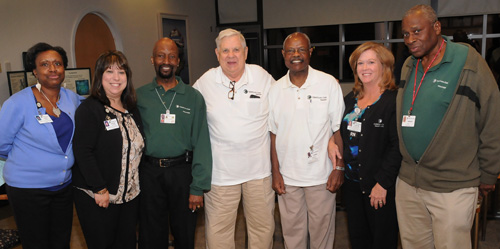

Thomas L. Carter of Wilmington lost his father to prostate cancer. His dad was 64, the same age Carter was when he was diagnosed.
“I wanted to avoid surgery if it was at all possible, so I started doing my homework,” he recalled. “Thank goodness I learned about an alternative at Christiana Care.”
He sought treatment at the Helen F. Graham Cancer Center & Research Institute, which provides brachytherapy, in which tiny, radioactive seeds are implanted in the prostate.
“It’s a knockout punch to the cancer,” said Viroon Donavanik, M.D., the radiation oncologist who successfully treated Carter two years ago. Because his cancer was diagnosed in an early stage, Carter had the brachytherapy procedure and was home from the hospital within hours. He remains free of cancer.
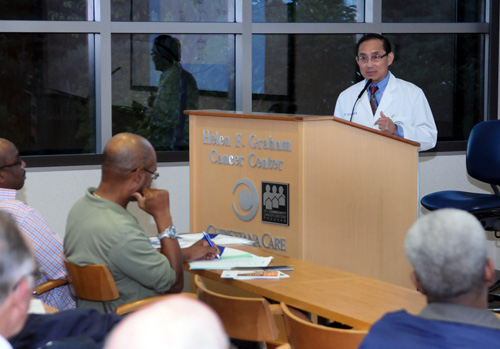
Carter and more than 40 others gathered recently at the Graham Cancer Center for a seminar about prostate cancer that included Dr. Donavanik, Stephen Grubbs, M.D., and Bruce Benge, M.D. The event also included members of the Warriors Against Prostate Cancer, a volunteer group of men who help to raise awareness about this disease — especially among African-American men, who are at high risk of prostate cancer.
One of every six men in the United States will be diagnosed with prostate cancer at some point in his life.
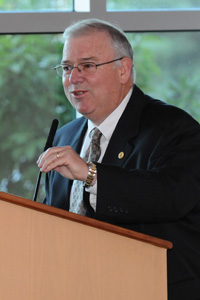
Dr. Grubbs, an oncologist, said family history is a major risk factor. In particular, a faulty BRCA2 gene, which contributes to breast cancer in women, can increase a man’s risk of prostate cancer by 400 percent.
Risk increases with age. Prostate cancer is most often diagnosed in men over 50, the age at which most men are first screened by measuring their prostate-specific antigen (PSA) levels. By age 90, almost all men have developed some stage of prostate cancer.
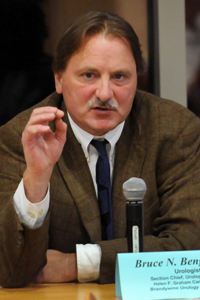
Because prostate cancer usually progresses slowly, the first course of treatment is typically active surveillance, in which doctors monitor the patient’s PSA levels. Men also are encouraged to make healthy lifestyle changes, including losing weight and eating lots of fruits and vegetables.
Dr. Benge, section chief, Urologic Surgery, talked about the latest surgical procedures for more advanced prostate cancers, including nerve-sparing operations that reduce the risk of incontinence and erectile dysfunction.
Warriors Against Prostate Cancer
Norwood “Woody” Sloan of Middletown lost his father and cousins on both sides of his family to prostate cancer. At age 60, he was diagnosed with the disease. In the fight to overcome prostate cancer in his own life, he began exercising. He learned to swim at age 69 and takes water aerobics three days a week. He also embraced a healthy diet.
“In the African-American community, everything is fried,” Sloan said. “Now, I cook with the three B’s: baked, broiled or boiled.”
Sloan didn’t stop there. His fight against prostate cancer led him to call a family meeting where he encouraged his relatives to seek genetic counseling and early screening.
“That was 22 years ago, and we haven’t had a death since,” he said.
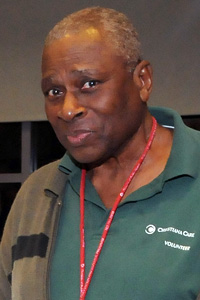
He became an active spokesman in the Warriors Against Prostate Cancer. Since 1997, the Warriors Against Prostate Cancer have been fighting the good fight in their communities, talking man-to-man about prostate cancer, colorectal cancer and other health risks. They support men who are undergoing treatment, and they speak at churches, health fairs, reunions and other events.
Their message isn’t only targeted to men.
“Women are often the ones who will get their men to the doctor for a checkup,” he said.
Under the direction of the Community Health Outreach and Education Program of the Helen F. Graham Cancer Center, these volunteers are making a difference. Thanks to education, outreach and improvements in treatment, fewer men are dying from prostate cancer. Between 2005 and 2009, mortality from prostate cancer fell 35 percent in Delaware, according to the Delaware Department of Health and Social Services.
“They have worked their hearts out for the more than 15 years to educate and enlighten men about this disease,” said Charlene Marinelli, RN, BSN, OCN, cancer screening nurse navigator.
Charles Cadogan of Wilmington learned that he carried the gene when he was treated for prostate cancer 11 years ago. As a Warrior, Cadogan first began educating men who gathered at his barbershop.
“I have eight children, girls and boys, and they have all undergone genetic testing,” he said.
Ben Fay of North Wilmington had a heightened awareness of prostate cancer because his father died of it. Doctors began monitoring him closely when a growth was detected on his prostate during a digital rectal exam. Several years later, when he developed cancer, doctors were poised to act. He was successfully treated and has been free of cancer for 17 years.
“By the time a man experiences symptoms, he is probably already in trouble,” Fay said. “That is why screening is so important.”
The Warriors focus on reaching out to African-American men. Fay, who is white, spoke to the volunteers about his experiences as a cancer survivor shortly after his treatment and has been a member ever since.
“I was so impressed by their dedication that I asked to join them,” he said.
Lorenzo Murdaugh’s first cousin was diagnosed with prostate cancer when he was in his 70s. In the 25 years since then, four of his cousin’s five sons have developed cancer.
“It’s a sneaky disease,” said the New Castle man. “That is why I talk about it whenever I have an opportunity, including lodge meetings and family reunions.”
Donald Lewis of Newark, who lost his father to prostate cancer, learned about the Warriors through his friend Ralph Bordley, a founding member. One of 12 children, Lewis encouraged his brothers and nephews to be screened, as well as his own son. He and his wife embraced a healthy diet. He speaks about prostate health at church events and community.
“I have always been a very shy person, but this issue has inspired me to speak out,” he said. “I tell the guys not to be macho. If you want to live to see your grandchildren, get tested.”
Looking for a few good men
The Warriors Against Prostate Cancer are looking for a few good men between the ages of 40 and 65 to help raise awareness about this disease. For information, call the Helen F. Graham Cancer Center & Research Institute’s Community Health Outreach and Education team at 302-623-4661.